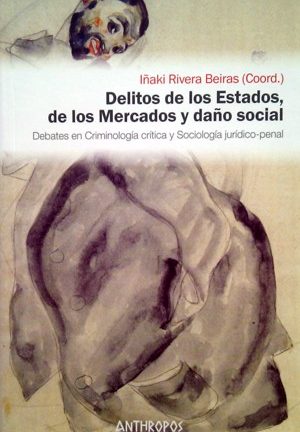
Crimes of States, Markets and social harm is presented within the Publishing Project Utopías del Control and Control of Utopia, a project in collaboration between the Observatory of Penal System and Human Rights (OSPDH) of the University of Barcelona and Anthropos Publishing house, coordinated by Roberto Bergalli and Iñaki Rivera Beiras.
The book, which coordinates Iñaki Rivera Beiras, exposes the debate about the epistemological status of Criminology (also critical) with the complaint of his silence about the wars, mass atrocities and social harm (first and third). Also published a series of works that have sought, from the reflections above, to examine some of the issues most important at the present time refer to the relationship between economic crisis, crisis of democracy and the production of social harm (the second part). With this collection of essays proposes a “new” political task of the Criminology and Sociology criminal justice, betting on the ability to pressing of the interdisciplinary analysis giving way to a model that is truly inclusive. So you blur the boundaries, the contours of a number of disciplines, discourses and praxis to open the door of horizon of knowledge to the study of international crimes and, beyond the legal definitions, the analysis of the processes of production and possible damage control social impact generated by the globalization of Markets and the role of the States in their permissiveness or connivance, at times, also kind of a criminal.
.
Index
.
Utopias of Control and Control of Utopia
Editorial project in collaboration between the Observatory of Penal System and Human Rights (OSPDH) of the University of Barcelona and Anthropos Publishing house
Coordinated by Roberto Bergalli and Iñaki Rivera Beiras.
The call concerned a criminal, in the fields of knowledge relating to the study and understanding of the societies, has been using in the last decades, in Europe, principles, categories and research methods of the social sciences. In some fields more restricted in human behavior, such changes were appropriate to explain, supplement or correct what until then had been the unique parameters of understanding of the criminal conduct: the medical and the legal. In such a mode, and with alterations also occurred in the field of the social theories, in which was felt with much force, the impact of the critical thinking of the so-called School of Frankfurt, the knowledge of criminological became, also, slowly but gradually, in a fertile ground of questioning the traditional know-how. The individual causes of the criminal conduct, the guidance of such knowledge and complementary of the definition legal-criminal of such conduct, they began to lose interest and central to be replaced by the study of the processes by which societies construct and apply the definitions of the behaviors reprehensible, both socially and legally. In this way it was like the knowledge of criminological expanded and, at the same time, became more social and political.
The true epistemological revolution occurred when it is definitely, the object of study of the tradicinoalmente called criminology moved the crime to the control of the same.
A new way of addressing the issue of criminal had been opened and, through it, for the first time in a coordinated manner, they were to be analyzed, for example, the processes of creation of the criminal law (Penal System is static), or the creation and update of the law enforcement agencies, judicial and prison System (Criminal dynamic). In effect, the object of study had shifted: it was now studying, researching and observing the System itself Criminal. This new epistemology is, on which rests this project Utopias of Control and Control of the Utopias.
.
A brief overview of Iñaki Rivera Beiras (Coordinator of the book)

Iñaki Rivera Beiras is a Graduate in Law from the University of Barcelona, 1985. Master (1989) by the “Common Study Programme on Criminal Justice and Critical Criminology”, of the Erasmus Programme of Cooperation Inter-European University (formed by six University Centres of the EU), with a Thesis dedicated to the examination of the Courts of enforcement of sentences in Spain, written and defended in English before a Commission integrated by Professors Drs. Alessandro Baratta (University of Saarbrucken, Germany), Jock Young (Middlesex Polithecnic, Uk) and Roberto Bergalli (University of Barcelona, Spain). Doctor in Law from the University of Barcelona (1993) with a Doctoral Thesis dedicated to the examination of the fundamental rights of prisoners in Spain and in the Council of Europe, which obtained the qualification of Outstanding Cum Laude. The author of numerous books (as sole author or as co-author and/or compiler) dedicated to the Prison Law, the History and Sociology of the Prison, and the Criminology and Criminal Policy; and articles and essays published in various academic works in Spain, Europe and Latin America.
